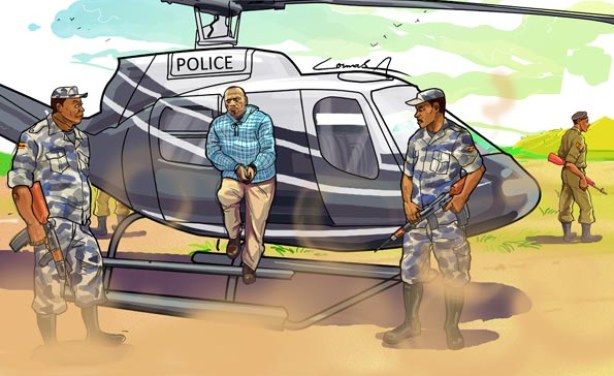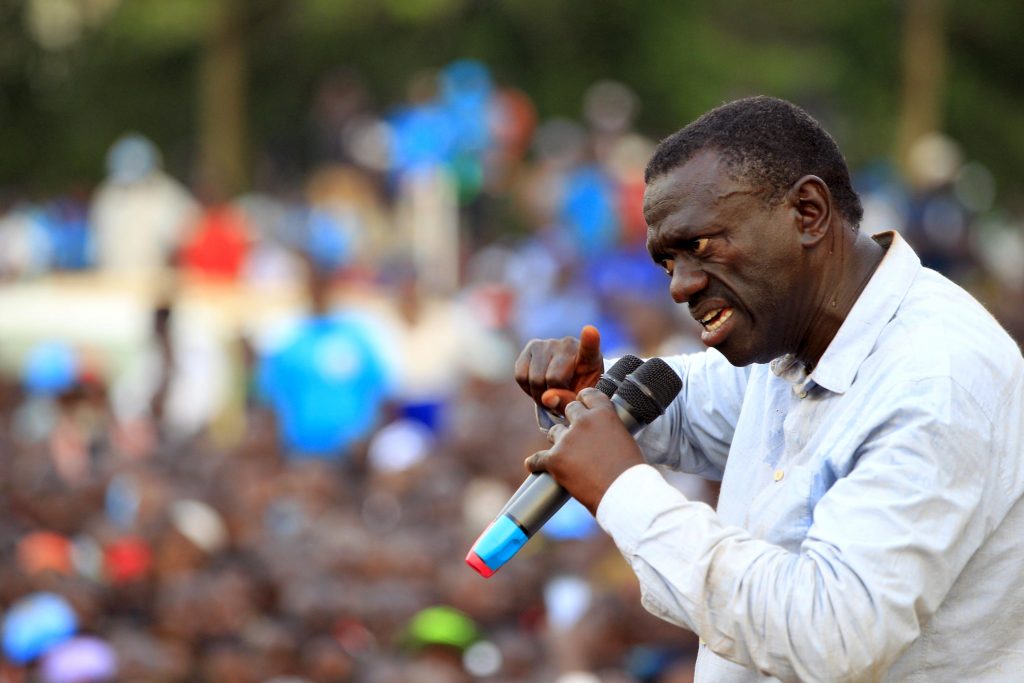
One morning in late February 1981, Kizza Besigye was preparing to fly to Nairobi to buy stethoscopes for sale to the growing number of private health facilities in Kampala.
According to the book, Kizza Besigye and Uganda’s Unfinished Revolution, authored by journalist Daniel Kalinaki, Dr Besigye collected his air ticket from the Uganda Airlines offices at Kimathi Avenue then walked to the Kampala International Hotel, as the Sheraton Hotel was then known, to meet Saidi, a friend who was also the son of a prominent Tanzanian opposition leader, Abdallah Said Fundikila.
Besigye headed to the hotel house telephone booths to announce his arrival.
He had just lifted the telephone receiver to his ear and was reaching for the rotary dial when somebody tapped him on his shoulder. Besigye turned around and saw a man he had never seen before.
“Put down the telephone,” the man said. ‘Why?’ Besigye asked. “Put down the telephone and come with me,” the man repeated, his voice growing firmer and impatient. He gave the man a withering look of anger and contempt. Who was this man and just who the hell did he think he was?
“You want to return Aminism here?” Besigye finally shot back. “If you want me, sit there and wait.” He was turning back to the telephone booth when the man now reached out and grabbed Besigye by the collar with one hand and yanked him out of the telephone booth. A pistol suddenly appeared in the man’s other hand and he pressed its muzzle against Besigye’s ribs. The power fight had shifted considerably into the man’s favour with the introduction of the firearm into the conversation
‘Seeing a man point a pistol at another also convinced other people in the hotel lobby about the importance of finding better places to be, and many hurriedly scampered outside and away to safety.
Another man who had been lurking in the background now also approached Besigye and the two led him outside the hotel. A Land Rover pick up truck was waiting at the hotel guest drop-off point. Besigye was thrown onto the back of the Land Rover, which then sped off.
He did not know where he was being taken, and why, but he recognised the familiar landmarks as the truck sped down the hill and, a few moments later, drove into the International Conference Centre, also known as Nile Mansions.’
It was this first time that compelled Besigye to join the guerilla struggle that had been waged by [now] President Museveni, who a year earlier had lost an election under his Uganda Patriotic Movement (UPM).
But nearly 35 years later, Dr Kizza Besigye himself, cannot possibly recollect the number of times he has been arrested by police, especially after he parted ways with President Museveni in 1999. He has also been arrested more times by police under the reign of IGP Kale Kayihura.
During the campaign season last year, Dr Besigye told a rally in Kibuku town on November 18 that he had been arrested at least 43 times since the 2011 general election.
Two days to the election day, Police arrested Dr Besigye again on February 15 at Wandegeya on his campaign leg in Kampala. He was arrested and released on the polling day Thursday 18 when he stormed a house in Naguru where he claimed election results were being manufactured.
On February 19, he was detained again by police and this time placed under house arrest. The presidential results were announced while he was under detention.
President Museveni, the incumbent, in power for 30 years, was declared winner of the 2016 elections with 60.7 per cent, giving him yet another five year term running up to 2021.
Dr Besigye, the closest challenger, according to the Electoral Commission, received 32 per cent of the tallied votes.
In the two weeks that followed, Dr Besigye was arrested by police at least eight times. Consequently, the Inspector General of Police Kale Kayihura, directed that he be placed under house arrest.
He was confined to his home in Kasangati, near Kampala from February to April 1 when police ended the siege at his home. Prior to ending the house arrest, Dr Besigye, through his lawyers David Mpanga and Peter Walubiri, had filed applications at the Kasangati Magistrate’s Court and the High Court seeking orders for police to withdraw from his home.
On April 5, which was supposed to be his first day of freedom after the 48-days house arrest, Dr Besigye had been scheduled to attend his party-FDC’s weekly prayers at their headquarters in Najjanankumbi, a Kampala suburb, but was arrested halfway into the journey. He was detained at Naggalama Police Station in Mukono District and was later released deep in the night.
In the days running to President Museveni’s swearing-in ceremony on Thursday, after several run-ins and arrests by police, Dr Besigye was confined to his house again early in May. He, however, beat security on May 11 and drove to town, where he was arrested again by police and the military, which viciously beat up his supporters in the city centre and flown to Moroto.
After detention in Moroto, Dr Besigye was charged with treason on Friday.
Once President Museveni’s personal physician during the guerilla struggle, Rtd Col Besigye fell out with the NRM party in 1999 after authoring a missive accusing government of derailing from their objectives that took them to the bush. He has since stood against him in elections for four times.
State reaction
After breaking ranks with the government, the State responded by placing Dr Besigye under a 24-hour surveillance and later virtual house arrest at his then home in Luzira, Kampala. However, on November 3, 2001, he beat the surveillance and escaped to exile, eventually settling in South Africa until October 26, 2005, when he returned to Uganda.
He remained a vocal critic of the government while in exile, and the government in return accused him of preparing for armed action under the auspices of the Peoples Redemption Army (PRA). PRA remained shadowy and facts as to whether it really existed or not remain scanty, but Dr Besigye denied any involvement with the alleged rebel activity.
Between 2003 and early 2005, the State arrested a number of alleged rebels, some reportedly from the Democratic Republic of Congo and others from different parts of Uganda. Some 22 of these alleged rebels would be thrust to the centre of one of the bitterest controversies in Uganda’s judicial history.
The now famous 22, including Dr Besigye’s late brother Musasizi Kifeefe, had been detained in different military facilities without any charge until Dr Besigye was arrested shortly after his return to the country. They were then jointly charged with Dr Besigye with treason and misprision of treason.
Dr Besigye had a separate charge of rape, allegedly committed in 1997, also slapped on him.
Then came a hearing of a bail application on November 16, 2005, before the High Court judge Vincent Lugayizi.
The Constitutional Court had ruled earlier that bail is a constitutional right and that so long as the applicant satisfied the court that he would show up to attend trial, he would be granted bail regardless of the charges against him. Mr Lugayizi granted 14 of the accused bail.
Dr Besigye was himself granted bail on November 25, 2005, but, on the basis of a warrant of commitment on remand issued by the General Court Martial (GCM), he was not released.
The charges in the GCM, which were based on the same facts as those before the High Court, were eventually read out to the suspects, who had been picked up from Luzira prison, on November 27, 2005.
Legal experts weighed in with criticism of the double trial – both before the High Court and the GCM. Mr Ronald Naluwairo, a law lecturer, eventually weighed in with an authoritative paper on the trial, titled The trials and tribulations of Rtd Col Dr Kizza Besigye and 22 others.
On December 14, 2005, Dr Besigye was nominated to run for president while in jail, but only after a series of arguments.
Between 2005 and 2011, he was arrested countless times, but on each occasion usually immediately released.

